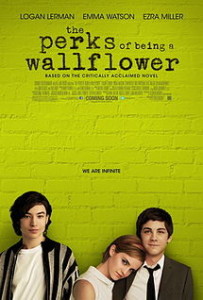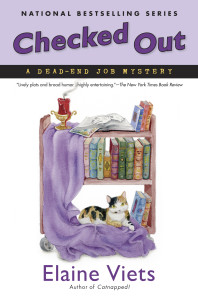By Elaine Viets
“She’s awake,” announced Julia.
“It’s about time,” replied her husband.
“Why is she even here,” Susan inquired.
She sighed. He whispered. She volunteered. He requested. She laughed.
I lost track of the plot, but I was fascinated by the synonyms for said. The novel was truly gripping as the author performed verbal gymnastics to avoid this four-letter word.
Characters inquired, interjected, blurted, agreed, argued, insisted, demanded, relented, confirmed, continued, conceded, spewed and squealed – yes, squealed.
 That’s when I threw down the book and roared: “What happened to said?”
That’s when I threw down the book and roared: “What happened to said?”
If I wanted to read a thesaurus, I’d get out my Roget’s.
Said is the wallflower of the writing world. It’s nearly invisible. That’s why we love it. Said showcases your dialogue. Said doesn’t get in the way of your story.
Said doesn’t try to do what’s physically impossible: You cannot talk and laugh at the same time. You cannot squeal a sentence. And spewing is too disgusting to contemplate.
My editor chopped “she laughed” out of my first novel, though she did let me say, “She said with a laugh.”
Here’s what I’m trying to say: If you want snappy dialogue, don’t clutter up your story with ridiculous verbs and impossible acts. Let it be said and be done with it.
I used said to start “Checked Out,” my new Dead-End Job mystery. Here’s the first chapter. Said gets the novel off to a good start, if I do say so myself.
Checked Out Chapter 1
“I need your help,” Elizabeth Cateman Kingsley said. “My late father misplaced a million dollars in a library book. I want it back.”
Helen Hawthorne caught herself before she said, “You’re joking.” Private eyes were supposed to be cool. Helen and her husband, Phil Sagemont, were partners in Coronado Investigations, a Fort Lauderdale firm.
Elizabeth seemed unnaturally calm for someone with a misplaced million. Her sensational statement had grabbed the attention of Helen and Phil, but now Elizabeth sat quietly in the yellow client chair, her slender, well-shaped hands folded in her lap.
Helen studied the woman from her chrome-and-black partner’s chair. Somewhere in her fifties, Elizabeth Kingsley kept her gunmetal hair defiantly undyed and pulled into a knot. A thin, knife-blade nose gave her makeup-free face distinction. Helen thought she looked practical, confident and intelligent.
Elizabeth’s well-cut gray suit was slightly worn. Her turquoise-and-pink silk scarf gave it a bold splash of color. Elizabeth had money once, Helen decided, but she was on hard times now. But how the heck did you leave a million bucks in a library book?
Phil asked the question Helen had been thinking a little more tactfully: “How do you misplace millions in a library book?”
“I didn’t,” Elizabeth said. “My father, Davis Kingsley, did.”
“Was it a check? A bank book?”
“Oh, no,” she said. “It’s a watercolor.”



Well said.
Why, thank you, she exclaimed.
You’re welcome, he replied.
Years ago, I even found a writer’s blog that provided a ‘very helpful’ list of all the verbs we ‘should’ use instead of ‘said.’
What I like to give writers who seem to be using the ‘helpful’ list is this quote from THE NEW YORK TIMES:
The Invisible Said – Don’t Be Lulled by Ludlum
From a review of The Bourne Identity by Robert Ludlum
The New York Times, March 11, 1990
…Aside from penning such panting prose, Mr. Ludlum has other peculiarities. For example, he hates the ”he said” locution and avoids it as much as possible. Characters in ”The Bourne Ultimatum” seldom ”say” anything. Instead, they cry, interject, interrupt, muse, state, counter, conclude, mumble, whisper (Mr. Ludlum is great on whispers), intone, roar, exclaim, fume, explode, mutter. There is one especially unforgettable tautology: ” ‘I repeat,’ repeated Alex.”
The book may sell in the billions, but it’s still junk.”
That said (or repeated), I’ve seen some excellent writers use verbs other than ‘said’ to good effect in group situations. Everything in moderation.
Fascinating bit from the NYT. I’d read Ludlum but never noticed that. Thanks for posting.
Yep, “said” should be the default. Other words can be used occasionally for variety, or when necessary, like whispered. Two other big errors to avoid:
1. Adverbs to prop up said
“I hate you,” he said hatefully.
Be clear from the context and words how something is said and you don’t need the adverb.
2. Never using any attribution.
Occasionally a writer will try using nothing but acton beats instead of said. But doing this over and over makes the reader form pictures and renders the dialogue more of a slog. Said does its job and gets out of the way. The action beat can and should be used for variety, but make sure the action really adds something and is not just a way to cue the reader as to who is speaking.
You’re preaching to the choir on this topic, Elaine. And you left out my biggest “pet” peeve: animal dialog tags. “I hate you,” she hissed. “Get on your feet,” he barked. Snakes hiss. Dogs bark. People don’t.
Nailed it, Joe. How about “howl,” and “roar”? Some bad writing sounds like midnight at the zoo.
Two pieces of excellent advice. The late Robert Parker was a master of telling a tale through dialogue, but sometimes he’d leave out the “said,” and I’d have to go back figure out who said what.
Elaine, great post. Great discussion.
I will have to admit that I like those action beats sprinkled in liberally. Besides action, they can be internal monologue that identifies the speaker and moves the POV closer, allowing us to know what he/she is thinking or how he/she is responding to what is being said or done.
Thanks for the post.
“Action beats” — that’s an new phrase. I like it.
If anyone is struggling with dialogue and tags James Scott Bell’s How To Write Dazzling Dialogue is excellent, she enthused. I mean, said.
I would like to exclaim, Sue: Thank you!
To which I laughingly assent.
“Great advice, Elaine!” I exclaimed.
“Thank you,” she asserted.
I hate to disagree with the New York Times, quoted above . . .
Well, no, actually, I LOVE disagreeing with the New York Times.
I went through the infantile/toddler phase where my characters wheezed, guffawed, sneezed then hawked (ew!), chimed in, agreed, disagreed, and/or quothed.
SAID works virtually 100 per cent of the time for me. And I see no reason to reach back into my childhood. My grandkids keep saying it. “Stop being such a baby, grandpa”.
Kids! What can I say? Except you said it, Jim and you said it right.
“Absolutely!” he yawped.
Really, “said” says all that needs to be said. Anything else should be apparent from the character’s actions. Enjoyed the post.
Blush.